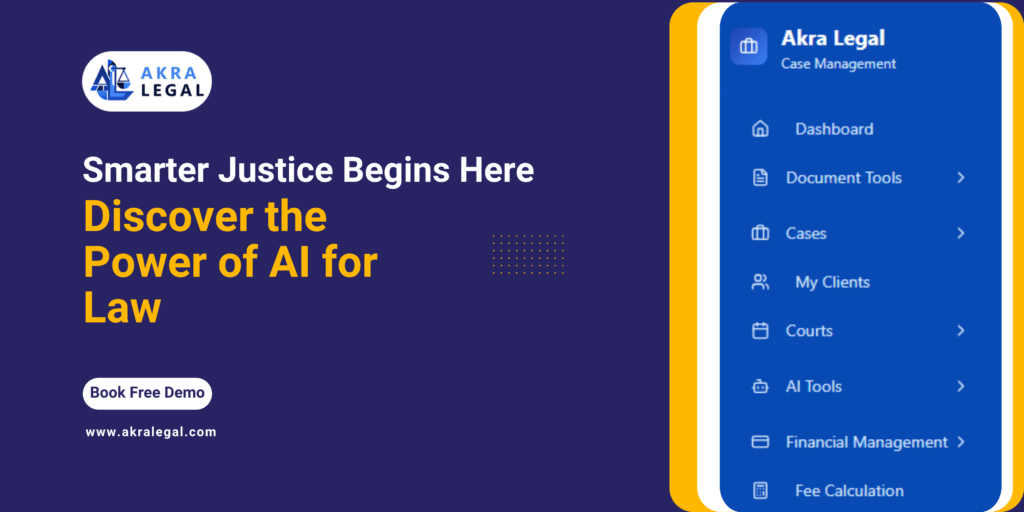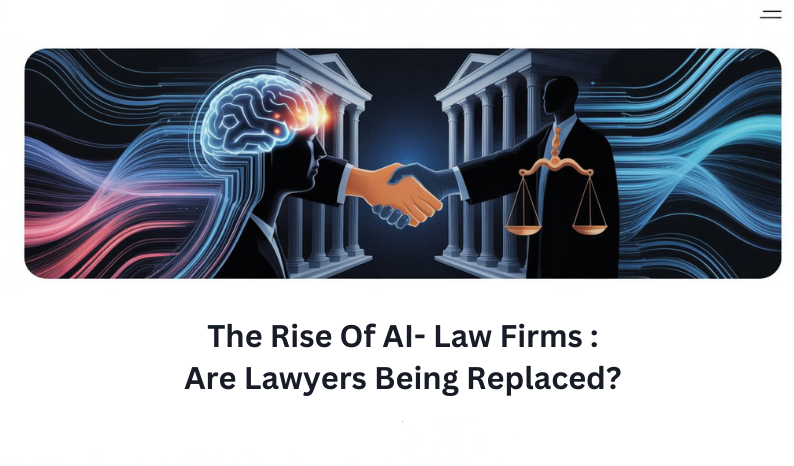
Introduction : AI for law Industry
The legal industry has been steeped in tradition; however, change is in the air. Evidence of this is the rapid deployment of AI for Law, which is changing the way legal professionals conduct research, drafting, and justice.
From AI lawyers that can review thousands of documents in mere minutes, to legal artificial intelligence tools that can predict case outcomes, AI is changing the way law firms work.
In this blog, we will discuss how AI for law firm operations is revolutionizing the legal industry for the better, the challenges and opportunities it presents to the legal profession, and whether AI will eventually replace lawyers in the years to come.
1) What is AI for Law?
AI for law applies artificial intelligence technologies such as machine learning, natural language processing, and predictive analytics to legal research and writing functions. These systems are designed to assist lawyers with research, drafting of documents, compliance, and case analysis. These tools do not replace human reasoning or judgment, but they augment what a lawyer does through the use of artificial intelligence and machine learning to automate repetitive and highly data-driven tasks.
Some examples of AI for law applications include:
- Reviewing and drafting legal documents
- Performing contract drafting and analysis
- Improving efficiency and effectiveness of legal research
- Predicting case outcomes
- Enhancing communication and management with clients
In a word, AI enables lawyers to focus on strategy, negotiations, and empathy—the human elements of legal practice.
2. The Emergence of Legal AI
In the past, legal work was manual. Lawyers spent hours thumbing through case books and reading precedents. With legal AI, that work is now many times faster, and more precise.
Legal AI enhances artificial intelligence in the legal sector by:
- Finding massive legal databases in seconds
- Utilizing natural language queries to identify legal precedents
- Identifying potential legal risk in contracts
- Analyzing data to recommend negotiation strategies based on similar historical outcomes. These aspects don’t just help lawyers to practice law faster, but also help them to practice law smarter. Law firms using AI for law firms are now capable of greater client satisfaction and greater profitability due to their efficiency and degree of precision.
3. Legal AI use in law firms
Let’s break down the general areas artificial intelligence for law firms is having a meaningful impact:🔹 Legal Research and Analysis of Cases.
AI technology such as Case text and LexisNexis uses natural language processing (NLP) and can quickly access a range of relevant laws and rulings.
- They can decrease research time by 80%.
- These tools eliminate human-led error in citation and relevance checking.
🔹 Contract Review and Drafting
AI can automatically identify problematic clauses, missing signatures, or outdated terminology within contracts.
- Can save law firms hundreds of hours each month.
- Enhances accuracy and compliance as laws change.
🔹 Client Relationship Management
- AI-driven CRMs track communications, appointments, and feedback.
- Clients get real-time case management updates.
- Firms promote transparency and credibility in the long run.
🔹 Predictive Analytics
After analyzing historical data, AI-based attorneys can provide clients with a reliable prediction of their success rates.
- Informs attorneys while advising their clients.
- Assists with informed settlement decisions.
🔹 Administrative Automation
- AI systems can automate time and billing, and tracking data flows.
- Reduces operational expenses.
- Allows staff to engage in high-level strategic work.
4. Advantages of AI for Law Firms
The benefits of AI for law firms are hard to miss:
- Speed & Efficiency: AI can do the job in seconds that humans do in days.
- Accuracy: Machine learning removes repetition from human errors.
- Cost Savings: Less workforce with automation means less labor-intensive tasks and billable hours.
- Scalability: Firms take on more cases without expanding the number of attorneys.
- Best Client Experience: Better and faster service leads to a trustworthy process.
In summary, AI in law allows law firms to provide more intelligent legal service while preserving the human touch that clients expect.
5. Barriers to AI Adoption in the Legal Industry
The potential of artificial intelligence in the legal industry is enormous, but the transition to full-fledged adoption will not happen without barriers.
- Data Security & Confidentiality: Law firms handle sensitive client data. It is important to maintain client privacy in AI platforms.
- Costs of Implementation: Using AI platforms involves investing in software, data infrastructure, and training.
- Algorithmic Bias: AI can reflect bias in the training data it was provided, thus invalidating its findings.
- Resistance to Change: Traditional law firms may be hesitant to accept technology over human judgment.
- Skills Gap : Lawyers will need to learn how to properly interpret AI results to act on the results.
These barriers can be achieved through ethical AI policies, data protection policies, and investment in continuous reskilling/upskilling.
6. Will AI Replace Lawyers?
One of the most frequently asked questions we receive from people is – “Will AI replace lawyers?”
The answer is No.AI lawyers will not replace, but could automate research, documentation review, scheduling, etc. AI LACKS:
- Empathy and Talent in Negotiation
- Critical Thinking and Moral Judgment
- Advocacy and Persuasion in Court
AI is here to augment human lawyers, not replace them. The future is lawyers working together with AI, using technology to perform routine tasks and spending time on the human strategy.
7. The Future of AI in the Legal Industry
The future of AI in law appears to be extremely bright. As AI continues to advance, we will see it woven more and more into every facet of legal practice.
Examples of trends we are seeing include:
- Predictive Justice Systems: AI predicting case outcomes and showing legal probability.
- AI Virtual Assistants: Addressing client inquiries 24/7.
- Smart Drafting: AI drafting documents in real time using databases.
- Hands-Free Solutions: Voice-enabled case law research.
- Ethical AI Policy: Governments regulating AI systems for fairness and transparency.
By adopting these trends, innovative firms may succeed ahead of the curve—as continual competitive advantage.
8. Best Practices for Implementing AI in Your Law Firm
If firms are thinking of adopting tools for the law, here are some guidelines to get it right.
- Start small: Utilize simple automation like document storage and billing to start.
- Work with reputable companies: Start with trusted legal AI tool providers to ensure compliance, confidentiality, and privacy of client data.
- Educate and train your employees: Provide recurring education and training to eventually ease-in lawyers to an adoption process.
- Track productivity: Track productivity, money savings, and client satisfaction.
- Be ethical: Explain to clients where AI was used on their matters.
These steps help to make your AI integration effective and reliable.
9. Cooperation Between Lawyers and AI
The legal system’s future is less about lawyers against AI, and rather more about lawyers working with AI.
- Lawyers can utilize emotional intelligence, creativity, and moral reasoning.
- AI can leverage automation, accuracy in data processing, and depth of analysis.
With their combined formations, they build a strong working relationship that can make the legal system smarter, faster, and more accessible for all involved. That is more true than ever.
10. Akralegal: Leading the Way on AI for Law in India
At Akralegal, we recognize that the next iteration of legal practice will be about innovation.
Our AI-powered platform will assist contemporary law firms in managing clients, documents, and cases through automating processes and using intelligent analytics with ease, and effectiveness.
From AI-assisted research – to predictive case assessments – we equip legal professionals to practice in a legal environment smarter, provide clients with more effective and reliable service, and lead the way securely into a digital world.
👉 Join Akralegal and experience AI for law; where technology meets the legal profession.
Summary
Legal technology isn’t just a current fad—it is a revolution changing the concept of justice.
Law firms that embrace legal AI technology now will become the leaders of tomorrow. By combining human knowledge with AI driven precisional service, lawyers can become more efficient, transparent, and client-focused.
The future of law is for those who change, create, and develop in artificial intelligence—and that future has begun.




